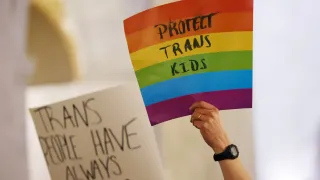February 24, 2025
Peripheral Visions: Flooding the Zone
Kilian Melloy READ TIME: 15 MIN.
"Peripheral Visions: You sense them from the corner of your eye or in the soft blur of darkest shadows. But you won't see them coming... until it's too late."
Flooding the Zone
Caden Standard found the leather-bound book in a plastic crate in the far corner of the cellar. It was boxed in by two heavy wooden chests and covered with tarps, a cardboard box holding small propane bottled and bungee cords, and – strangely – a large bag of what looked like zip ties.
Caden smiled to himself as he held up one of the zip ties. He wondered about the erotic possibilities it presented, and wondered fleetingly if someone in the family had used the ties for such purposes, though he thought it unlikely. The Standards were one of the community's most pious families, equally committed to the Bible and to Capitalism. There was no room in Standard doctrine – or in standard doctrine, either – for such outrageous carnal indulgences.
But there was room in Caden's life, and is imagination, for such things because of his special friendship with Silas Orvan. He and Silas had been best friends since childhood; their fathers approved, seeing them as natural allies who would take leadership of their respective families with the strength and savvy expected of all alpha males. Caden and Silas were expected to safeguard their families' honor, not to mention their status as shareholders in the country's leading corporations. They were part of God's Great Design for prosperity, after all: The Blessed overseeing the country's Workstock and reaping the benefits of its labor; the workers laboring for the righteous honor of the nation as a whole. Nothing could be more patriotic than to acknowledge the Great Design and embrace one's role in it.
But there was more to their bond than their fathers knew. Yes, Caden was scheduled to marry Polly Zamora a few months' time. At the age of seventeen, he was more than marriageable, and Polly, at thirteen, was at the zenith of her womanhood. Silas, too, would be married before the end of the year, and the Faith and Family Laws required them both to impregnate their first wives within months of marrying them. Then the family matchmakers would begin the process of selecting their second wives. The process then would repeat so that they each had a full, respectable complement of three wives, lifetime commitments as long as the wives remained loyal, humble, obedient, and pregnant.
Infant mortality rates being what they were, there was really no other way for a family of good standing to secure its position and its future. But as long as they kept the family coffers full, along with the family nurseries, there would be no limits to the lives they led. Such was the special province occupied by the Blessed: Those with standing, those with money, those who owned the world. Of course, Caden and Silas could never tell anyone of the unique spin on make friendship they had discovered. How could anyone else understand? No one had ever conceived of such a thing as two men becoming a single flesh, as the Book of Sureties said was natural for man and woman.
It was natural, too, for Caden and Silas. Caden wondered it that made them especially blessed, but something in him, some instinctive caution, dictated secrecy and discretion when it came to his special afternoons and evenings with Silas.
Then Caden made a connection, and realized that the zip ties – whatever other uses they might have – had played a part in his family's rise to prominence. He recalled his father's stories of the Purefaction, the great uprising of the righteous that had seen the Enemies of the People taken into custody, removed from their ill-gotten positions of power and influence, and summarily executed.
Schoolteachers. Librarians. Liberal pastors. Dissenters. None of them could be trusted.
His father spoke with nostalgia of the weeks and months of righteous action. He himself had hunted and captured a woman who had led the congregation at a now-outlawed pagan church, the name of which Caden no longer remembered. Universalists or something. He had also apprehended a man who had run a food pantry for the poor – "Pure socialist garbage!" his father seethed, still enraged at the memory of it – and a child abusing doctor who had injected innocents with body-corrupting vaccines. "He said he was preventing disease,: Caden's father boasted., "but he was disease!"
Caden, smiling, pocketed a few of the zip ties, thinking they might come in useful later that week, when he and Silas had their usual Thursday confab. He and Silas had traded the stories of their fathers had handed down; Silas' own male lineage was just as full of heroic acts during the Purefaction, but Caden was extra proud of his father's contributions to the Just Society in which they lived, since his father's father had died young and his father had no male siblings. The family's honor was rooted in the work of one man, and that was Caden's father.
But then Caden found the plastic crate, and the leather-bound book, and the handwritten pages it contained...
***
The book was a journal, and its author was a man named Daniel... Daniel Standard.
An ancestor? Caden wondered.
The pages were full of anger and sorrow. They described a world very different from what the history texts taught once existed. Caden had grown up hearing about the Times of Chaos, when people of any color and any merit were simply mixed together, the theory being that people of quality would prove their worth and rise to the top. That flawed ideology was made even more corrupt when Satanic manipulators began to elevate inferior people to key social and economic positions, all with the aim of destroying the Sacred Bonds of Family and causing the disintegration of Blessed Capitalism, leading the way to Global Socialism... and Global Control.
Caden was smart enough to doubt the accuracy of the lessons – they rang of propaganda – but he didn't question the need or the righteousness of the great cause of Purefaction.
Now, though, reading the pages that Daniel Standard had recorded in neat penmanship (he had used some sort of writing implement? He had written out all these pages by hand?) Caden was starting to glimpse a bigger, more self-consistent world than the one he had always learned about.
Replacing the plastic lid, the old book in hand, Caden sat on the crate and read the journal from start to finish, feeling the world he had thought he knew and understood uprooting, tilting, and finally rolling over him.
Daniel Standard had been born in 1996. He had grown up in a poor family, but his parents had worked hard and carved out a place for themselves... Mother and Father, Daniel and his little brother, Willard.
Willard?
The name of Caden's father. Willard was three years younger than Daniel, which meant he had been born in 1999... the year of Caden's father's birth. Yes, it was the same Willard Caden. That meant Daniel Standard was Caden's uncle – an uncle he had never heard about.
Willard was 25 and Daniel was 28 when the world Daniel described in his journal changed. Daniel set out a shocking sequence events, recording, step by step, how a nation without Owner and Workstock classes degenerated into a free-for-all of suspicion, brutality, and oppression. To his shock... and a soul-shaking thrill... Caden read about how Daniel had been married not to a women, but to another man, a man named Soren who had emigrated to the United States at the age of twenty.
We are not unique? Caden thought, a thrill passing through his body and his mind. Somehow, he had always assumed that he and Silas had invented sex between men... now he realized that such congress, though never spoken of or hinted at, was far from unknown. If his father's own brother had openly pursued a relationship with another man, then his father... all of society, for that matter... had to have been familiar with the idea. Moreover, men like himself and Silas existed... perhaps were commonplace. They were not alone in their urges, in the way their males souls and bodies found comfort and completion in other men.
Why did no one ever speak of this, or even hint at it, now?
Caden returned to the journal, devouring its pages. Daniel wrote about how Soren had come to the country legally, how he had been a researcher working to defeat cancer. The family had welcomed him, loved him, counted him as one of their own.
Then the great change happened, and the family – led by Willard – turned on them. Soren was vilified as an "invader" – and as a "queer." Daniel was labeled a "predator" for his "choices" of marrying a man, and, worse, a man from another country.
Queer? The word had a strange taste to it. Caden intuited its many levels of meaning: Strange, unusual, gifted...
And different. Different in dangerous ways. Like Caden himself, who had lain awake nights wondering why he had to marry Polly, wondering how he would coerce himself into impregnating her when he had absolutely no procreative interest in her. Silas, too, had such doubts and fears, and they had spoken a few times of a wish they shared to find a place somewhere on earth, some place of solitude where two men could live in one house – small and modest as it might be – with only each other, not required to have wives and children, not required to do economic battle with each other and with the unfortunate souls that made up the Workstock. Why couldn't two men simply retreat to a corner of simplicity, a place of peace, and be allowed to live their lives as they wanted?
In America, once, that had been possible. Daniel talked about it in his journal, longing for the days when he and Soren had walked down the street together and attracted no special notice, no threats or insults.
Threats? Insults? Men had loved other men, everyone knew it... and yet somehow those men were still attacked? Caden re-read the sections where Daniel described Willard's insults and slanders. Yes, he realized: People had known, and people had condemned.
The impulse for secrecy must be a reflex as deep and primal as his love for Silas, Caden reasoned. Other men like them certainly existed, and those men, too, kept quiet.
But why should they have to?
Caden had never dared to say words like "love" and "husband" to Silas, but reading Daniel's memories of his wedding to Soren, reading Daniel's account of the bonds of commitment and devotion they shared, and even basking in the few sentences here and there in which Daniel described some mundane domestic task, he recognized his own instinctive feelings for Silas, and he recognized his own yearnings to be happy... and to be free.
Reading on, Caden realized that while some – like Willard – demonized men who loved other men, the law had once honored them and the lives they made with one another. Society as a whole, despite hateful outliers, must also have honored those men. What had changed? And how?
"People who voted for the HE WHO SHALL NOT BE NAMED tell me that Soren and I will be fine," the journal read. "Our rights will not be curtailed, they say. Our marriage will not be criminalized. But it's only been a few months since the election and already the signs are there. So many ordinary people whose jobs and lives were once unremarkable are now branded as enemies, or traitors, or blasphemers – how can Soren and I not be next?"
The great change, Caden thought. The Purefaction. Perhaps it was not so righteous after all; perhaps it had not been so purifying. Perhaps it had brought darkness and fear, rather than light and freedom.
"We have begun to look at ways to return to Denmark, where our marriage and our rights will not be challenged, and where we won't face charges simply for our views, or for the fact that we are queer," Daniel's journal read. "But every day, buried in the torrent of meaningless lies and absurd proclamations, the firehose output of wild exaggerations and tall tales, there are new roadblocks, new requirements for international travel. And as a new round of tariffs are about to come into effect, there's even talk of closing the border... not just to migrants, but to Americans who want to travel abroad.
"What makes me most angry is when people say money will protect us," Daniel's journal went on. "We managed to live a middle-class lifestyle, but that doesn't mean we have money – not the kind of money we need to find safe haven. Not all gays can just put down a million dollars to buy New Zealand citizenship and then fuck off out of America when things roll downhill into fascism."
Daniel's journal described how society frayed, disintegrating at an accelerating rate; how the country became cruel, and people once left alone to go about their business now found their very existence to be a criminal offense. The journal described how, in this very city, an entire neighborhood had been targeted for destruction by creating a new reservoir.
"The Westgate part of town will be underwater in a few months if the city council and the county commissioner have their way," Daniel wrote. "And why? Because that's where the protests happened a couple of weeks ago? Because that's where most of the people of color in this city happen to live? It's not just a matter of geography, like we're being told. And the speed this is all happening, and the lack of proper planning, it all tells me that this is nothing other than political payback. No, it's even more cruel that that. It's a power play, intended to intimidate. Make an example of the Westgate neighborhood and its people – that's what they are doing!"
Several pages later Daniel sketched out an account of how the neighborhood was inundated – flooded, drowned – while police and national guardsman took up positions on the streets and opened fire on residents fleeing the rising water.
Daniel was describing the creation of Lake Skinner, Caden realized. He and Silas had swum any number of times in Lake Skinner. They had taken Silas' boat and sailed it there. One midnight, bobbing out on the water, they had even traded the delight of tongues and tender kisses... all with murdered homes, murdered bodies haunting the depths below...
"Now that they have canceled all passports and closed the borders, our only hope is the underground railroad. I hope we still have time," Daniel's journal read. "I have to leave this book behind. I don't dare take any ID. I have to shed my past, my name. We have to travel light – just the clothes on our backs, and all the money we have, which isn't much in cash. Will anyone take our cash? Will the border guards take it? Soren has some digital money, he was smart and got ahead of the curve as digital money started replacing U.S. currency, but it won't be enough. He has to take his phone to make any such digital payments, and they will be able to track him through his phone. The guards probably won't worry about any of that. They are immune from pretty much any crime at this point. But us? If we caught? If the guards take our money and then betray us? I don't hold out much hope for our chances of surviving this desperate flight.
"And yet," the last sentence of the journal read, "hope is the only thing we still have, and we must hold fast to it."
Only half the book's pages were filled, but that was the end of the story.
Caden closed the book and held it tightly in his hands. A feeling of fury swept through him. People like Daniel... like himself... had once been free. Everyone had once been free. And now...
It's all a lie, Caden told himself. It's all been one great big god-damned lie.
Carrying the book in his hand, Caden climbed the steps from the basement and found his way to the parlor, where his father sat, a cigar in his hand, scrolling through his tablet.
"I'm working, son," his father told him, without looking up.
"What did you do?" Caden asked, his voice trembling with rage.
His father looked up then, his eyes meeting Caden's for just an instant before they diverted to the book in his hand.
"What do you have there?" he asked.
"This?" Caden held up the journal. "This is the life story of your brother Daniel. Your queer brother Daniel."
"Queer? What are you talking about? Where did you hear that word?"
"It's here. It's all in here, Dad, along with the story of how America the Beautiful became America the Damned. The 'Blessed Society?' This country is a Satanic mockery of everything true!"
His father tossed the slate aside and got to his feet, glowering. "You fucking punk. Do you have any idea what we had to do to make this country safe? Safe for you? We made all of America a gay-free zone. You shouldn't even know a word a like that, and you shouldn't have thoughts like that in your head or feelings like that in your body."
"But I do, dad. I do! I'm the truth your lies can't paper over!"
"Don't talk shit, boy! Of course you're not gay. There are no more queers – that word doesn't even exist anymore! You know how much blood, how many bodies, how much stink it took to make that happen? To make America great, like she is now?"
"Don't tell your lies to me – you murderer!" Caden's voice was a scream, his face pale, his eyes pale with brimming tears. "It's obvious what happened to Daniel, and why you pretended he never even lived. Is that what you'll do to me now? Am I next?"
"Are you next? Listen, boy, I did everything so that you wouldn't be next... the next victim of some twisted gender ideology, some sex ideology." His father glared at him, then a shadow flitted across his face. "Yes, it's true, Daniel had to go. I saw to it! I sacrificed my own brother so that you would be safe – so that all the children would be safe!"
Caden stared at his father in horror, shaking his head at the justifications that felt anything but true.
"And we did it," his father continued. "The children were finally safe. The women were finally, finally safe – safe from wicked men dressing up like ladies, safe from sex and sin, saved from their own delusions of equality. Women voting? What country can survive that? It's no wonder America was turning into a Marxist nightmare! Finally, finally we stepped up and acted like men. We did the work, we pull the country back from the brink. It was finally respectable, and finally safe, to be a white man again. We did that! It took blood, it took guts, it took courage – and it took faith!"
His father had seemed almost pleading for a moment, but in a sudden shift his rage was at the forefront once again. He pointed at the book in Daniel's hand. "And this?" his father bellowed. "This is how you thank me? My work, and my pain, and my sacrifice, all so that suddenly that same old evil could sprout up again in my face?"
"This is who I am!" Caden screamed. "This is who I always was! And you wanted to make me safe? Who's gonna make me safe from you?"
Caden's father suddenly seemed very calm – too calm. He reached into his pocket and pulled out his phone.
"What are you gonna do, call the cops?" Caden snarled. "And how much are they gonna pay you for turning me in?"
Daniel's journal had included passages about the person Willard became under the influence of the nation's leaders as light turned to darkness and freedom curdled into oppression. Daniel had written more than once that he expected Willard to denounce him for a reward, and he wondered how much it would take. As the bounties increased – $6,000, $12,000, $18,000 – he wrote repeatedly of his amazement that Willard had not sold him out yet.
"How much did they pay you for betraying Daniel?" Caden screamed. "What, at long last, was the going rate for your own brother?"
His father smiled, the last vestige of pretense falling away. It was a cold, mercenary smile.
"They paid me plenty," he said. "The money made a difference, it helped cement our family standing. That was Daniel's reparation to us. But even more valuable was the honor we regained. You can't buy reputation, son... and no one, not even a beloved firstborn, can be allowed to take a family's reputation away." He pressed a button on the phone, and Caden whirled, running through the house, out the door, and into the hot, quiet night the swaddled the town.
Caden expected to hear sirens at any moment. But all around him there was only silence; the streets were calm and empty. It was past curfew, and not even food delivery workers were out.
He ran, ran... toward Silas' house, toward the memories of happy days with Silas, toward the dreams they had shared in secret, dreams only half-envisioned because neither of them had words or any clear sense for the possibilities they knew should have been their birthright.
No... not Silas' house. He couldn't implicate Silas.
He ran toward the lake.
Reaching the glittering shore, Caden stopped. He clutched the leather-bound book to his chest and heard his heart pounding. He listened for the thrum of helicopters, the barking of dogs...
The silence was uninterrupted. There was no chaos of police or church enforcers closing in. There was no jeering crowd with torches and pitchforks, as in old movies he had seen – mindless throngs thirsting for blood that he and Silas had laughed would come after them if they ever spoke their secrets aloud.
Their laughter had covered a real fear.
But now? Caden felt no fear, only anger... anger and sorrow. He stared at the lake's black surface and imagined his gaze with X-ray properties, penetrating the murk and the deep, piercing time, bridging worlds to where the specters of those betrayed and murdered in the name of some holy cause stood fast and stared back.
Caden thought he glimpsed movement in the shadows around him – there, up the shore; and there, across the water – and there, when he glanced at the park behind him and the street beyond.
How much will they pay Willard for me? he wondered. How much honor will the murder of his son yield? What sort of dividend?
Holding the book tight to his chest he walked forward, into the water. He heard the police and the magisters, heard their large, strong bodies press into the gravel near the water's edge as they walked closer, heard their anxious breathing.
His own breath was calm and steady, his heart defiant.
He thought of Silas as the water closed over his head.
Be safe. Find happiness. And some day...some day, may you be free.
Next week we peer across time and distance to a safe place where Jace was sent as a child to escape... what? War? Famine? Plague? It might take him a lifetime to discover the secrets of the "Reservation."






